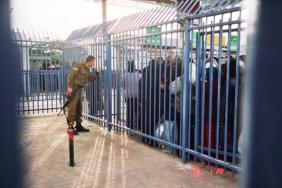You who stand in the doorway, come in, drink Arabic coffee with us and you will sense that you are men like us, you who stand in the doorways of houses come out of our morningtimes, we shall feel reassured to be men like you! Under Siege, Mahmoud Darwish
Two and a half million Palestinians live on the West Bank. Nearly half, more than a million, are minors, not yet fifteen years of age (UN and Palestinian statistics). Two and a half million human beings transparent in the eyes of most Israeli soldiers, their commanders, and most citizens of the State of Israel.
Fear is contagious. Its use creates internal social traps, and equally causes blurring of the human image of the "other" - the opposing side.
Israeli society is united in its fears of the common enemy (Palestinians wherever they may be) as a constant threat to its existence and security, and therefore must defend itself and limit its freedoms. Since the society distinguishes no detail of humanity, of personality, needs, pains and sensitivities, it converts the Palestinian into invisible, without uniqueness, bereft of voice, smell or touch. It is therefore no wonder that the checkpoint soldiers - in practice the sovereigns who run the routines by their own judgement - are incapable of grasping a child's pain, an old-timer's distress, a woman's helplessness, a mother's fear or a father's concern. It is inconceivable that "they" should sense the same pain as the soldiers.
On the last Friday of Ramadan this year (2008), when tens of thousands sought to pass to the el Aksa Mosque in East Jerusalem, to hold there the important prayer commanded by their religion, they were blocked and pushed back aggressively by a Border Police force. An elderly man turned to the officer who was shoving him, and asked: "What would you say if someone behaved that way to your father and mother?" The officer's face reflected the insult and anger of the comparison between his parents, whom he honoured, and "Arabs."
In the recent years' new realities at the checkpoints (or, in laundered military jargon: border crossings, terminals),there is a growing trend of isolating the soldiers from the Palestinians by means of sophisticated mechanisms. The soldiers encounter the Palestinian from a distance - a so-called "sterile space" - and communicate with him over loudspeakers, computer screens and electric switches which open and close iron gates
space" - and communicate with him over loudspeakers, computer screens and electric switches which open and close iron gates , turnstiles and pens. In this sterile space there is no requirement to activate feelings and human discretion: after all, the Palestinians are not really human beings like us. This worldview, which the army diligently fosters, serves the Occupation steamroller and is a source for the cruel behaviour of soldiers to the local population, which we frequently witness at the West Bank checkpoints.
, turnstiles and pens. In this sterile space there is no requirement to activate feelings and human discretion: after all, the Palestinians are not really human beings like us. This worldview, which the army diligently fosters, serves the Occupation steamroller and is a source for the cruel behaviour of soldiers to the local population, which we frequently witness at the West Bank checkpoints.
- ...Shlomit points out that they must be more attentive to the locked crossing, because a very old man lives here, and there could be emergencies! The First Sergeant responds: "So an ambulance can come from there (indicating the direction of Tulkarm), and if not there is a cemetery close by." Qalqiliya report, 21.10.08, observers: Shlomit S, Noah P. (to read the full report press here )
- ...an elderly woman, standing with difficulty, asked Racheli to help her since she couldn't meld into the masses. Racheli pleaded with a soldier to let the old woman cross with her daughter down the humanitarian line - the soldier refused.
- ...we saw an elderly woman who was feeling ill collapse on the ground in the humanitarian line. After a few moments, she got up very slowly and, supported by her daughter, walked towards the taxis. From Huwarra report, 22.10.08, observers: Racheli BO, Dorit H. (to read the full report press here )
- ...a youngster bypasses the overhang and tries to reach the soldier standing in front of the turnstile. He is frightened (justifiably) and progresses slowly, hesitantly. When he reaches a place from which the soldier can hear him, he asks to tell him something. He appears to be pleading. The soldier starts shouting and drives him back. The youngster tries again, asking, begging "just one minute, just one word," and he waves a document. Because of the distance, we cannot hear what is said, apart from the soldier's shouting. The youngster retreats, his pleading face still turned to the soldier. Midway down the line, he turns plaintively to the people waiting, and they let him into the line. He explains again, and within minutes progresses to the head of the line. Seems that there is a reason for his move up the line, otherwise the people would not concede so easily. The soldier summons him to the checking point, and then grabs him by the neck and throws him - without listening to his story - to the end of the line. From Huwarra report, 23.10.08 pm, observers: Amit Y, Daphna B. (to read the full report press here ).
